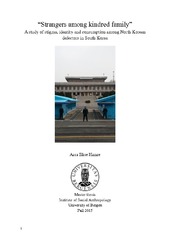Strangers among kindred family
Master thesis
Permanent lenke
https://hdl.handle.net/1956/11652Utgivelsesdato
2015-12-11Metadata
Vis full innførselSamlinger
Sammendrag
This thesis is a study of stigma, identity and consumption among North Korean defectors living an urban life in Seoul, South Korea. I wanted to explore the challenges North Korean defectors face being integrated into South Korean society. Drawing on ethnographic research, seven North Korean defectors, arriving South Korea via China and Mongolia participated in this field study. How do North Korean defectors overcome the obstacles of resettling in a new country, and at the same time deal with identity, establish networks and overcome possible stigmas? I wanted to research identity and the social self, trying to capture this by looking at consumption and possible stigmas in the society. A central question is whether the new modern society, where the individual has fewer permanent attachments and more choices than ever before, leads to a greater understanding and depth of knowledge for the individual, or whether it leads to confusion and rootlessness. The demographics of defectors have changed from being the powerful elite that defected before the 1990s, to people from all walks of life - often those who are far less privileged. The historical shifts in both South Korea and North Korea provide the background. Songbun, North Koreas stratified class system, gives an possible understanding of why defectors flee the North and how songbun can affect the adaption process for defectors arrived in the South. The main findings of this thesis are that North Korean defectors do their best to hide their identities as North Koreans in a highly competitive and stigmatized South Korean society. Thus, North Korean values and way of life cannot be expressed and defectors cannot take pride of their North Korean identities. Modernity and consumption become tools defectors actively use to portray themselves as South Koreans, and by taking up South Korean way of speech, dress and consumption patterns, North Korean defectors try to shed their North Koreanness".
